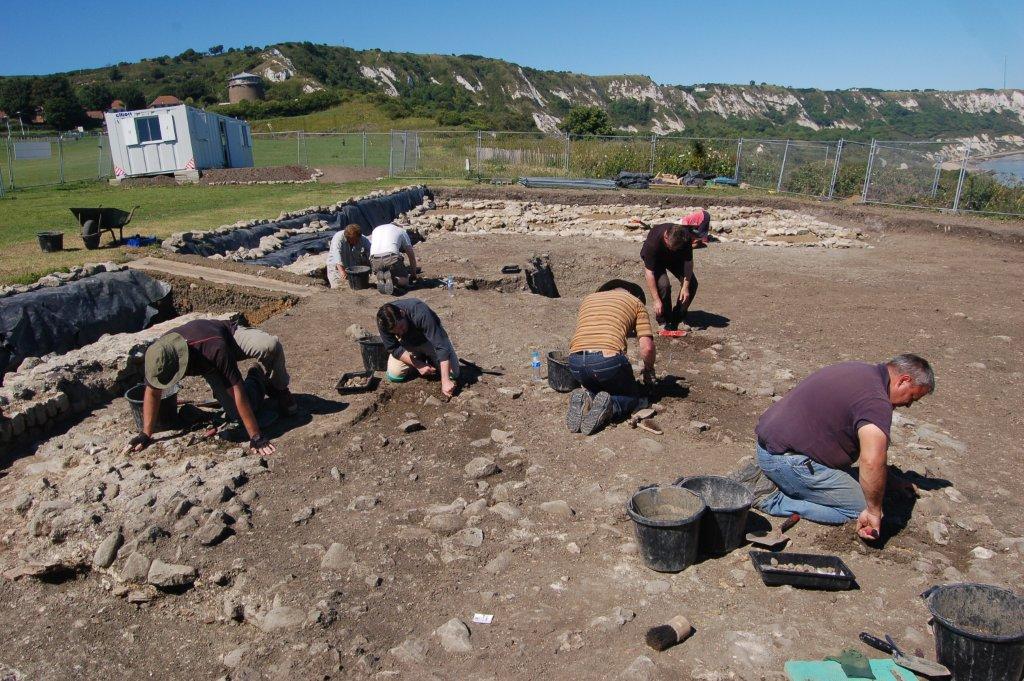Fieldwork
This listing expired on May 31, 2025. Please contact lindsay.banfield@canterburytrust.co.uk for any updated information.

Location: East Wear Bay off Wear Bay Road, East Cliff, Folkestone, Kent, CT19 6PR
Season: July 7, 2025 to July 18, 2025
Application Deadline: May 31, 2025
Deadline Type: Contact for Details
Website: https://www.canterburytrust.co.uk/east-wear-bay
Program Type:
Field School
RPA Certified:
No
Affiliation:
Canterbury Archaeological Trust
Project Director:
Canterbury Archaeological Trust
Project Description:
Canterbury Archaeological Trust would like to invite applicants for placements at its award-winning East Wear Bay Archaeological Project. The excavation is a community project with the aim of researching the historic landscape of East Wear Bay and preserving archaeological remains associated with Folkestone Roman Villa ‘by record’ before they are lost forever to coastal erosion.
Multiple phases of occupation exist at the site dating from the Roman period back to the late Bronze Age. Evidence for international, national, and local trade alongside roundhouses and other domestic finds have been uncovered. The most significant discovery has been of an extensive quern stone production area dating, at its height, to the late Iron Age. The querns were made from the local greensand stone brought up from the cliffs and beaches around Folkestone.
A major new programme of excavation began in 2023 at East Cliff and will continue until 2026. This will be focused on ground outside (i.e., seaward) of the main villa buildings, across the area most at risk from coastal erosion. The aim will be to set the known villa buildings into both their contemporary local landscape and chronological settings. The new excavations are expected to reveal further remains of prehistoric and Roman date, including buildings, complexes of ditches and rubbish pits, all adding to our growing understanding of the history of this major site.
The 2025 season will focus on areas close to the main villa structure.
Period(s) of Occupation: The archaeological site at East Wear Bay has a complex history. As presently understood, following some activity during earlier prehistoric times, this area grew to particular importance during the Late Iron Age, when it served as the focus of a quern-stone production industry and probably functioned as a port of trade with the developing Roman Empire. After the Roman Conquest of Britain, a major villa complex, whose full extent is yet to be ascertained, was established on the site surrounded by a system of ditched fields and enclosures that replaced earlier ones belonging to the Late Iron Age settlement. Two-week field school placement: £800 to include all training and necessary equipment, plus accommodation in a 4-person shared apartment in Folkestone. Please contact us for more information. We are happy to make suitable recommendations to those wishing to find their own private accommodation in the Canterbury or Folkestone areas.
Notes:
Two-week field school placement: £800 to include all training and necessary equipment, plus accommodation in a 4-person shared apartment in Folkestone. Please contact us for more information. We are happy to make suitable recommendations to those wishing to find their own private accommodation in the Canterbury or Folkestone areas.
Without accommodation, fees will be £650 per person.
Project Size: 1-24 participants
Minimum Length of Stay for Volunteers: Two weeks for full training programme. If participants wish to stay as volunteers after the field school is complete, the project continues to run until Friday 25th July. We are not able to provide accommodation for volunteers to the project.
Minimum Age: 18
Experience Required: No prior experience required.
Room and Board Arrangements:
Accommodation is included for an additional fee (£800 total cost with accommodation, which includes the Field School fee) and comprises a private bedroom in a shared 4-person apartment in Folkestone, Kent. The accommodation includes a communal kitchen and shared bathroom. Only students and staff from the field school will be staying in the apartments.
We are happy to help those wishing to find their own accommodation and can make suitable recommendations.
Academic Credit:
CAT provides accredited professional training. Individual progress is logged using the BAJR skills passport, a document recognised by most professional and academic institutions in the UK.
Lindsay Banfield
Canterbury Archaeological Trust, 92A Broad Street
Canterbury
Kent
CT1 2LU
United Kingdom
The AIA is North America's largest and oldest nonprofit organization dedicated to archaeology. The Institute advances awareness, education, fieldwork, preservation, publication, and research of archaeological sites and cultural heritage throughout the world. Your contribution makes a difference.
Notifications